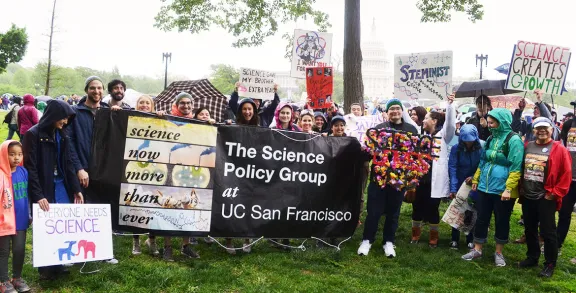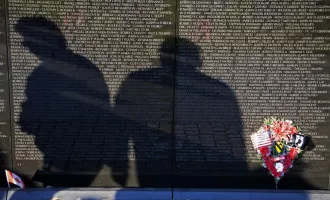
Is the March for Science political?
“Is the March for Science political?” my friend asked me a week before the march. “Why are you doing it?”
I thought about these two questions leading up to the UCSF Stand Up for Science Rally and March for Science, which I participated in along with hundreds of UCSF students, postdocs, faculty, staff and community.
In the months preceding the event, the UCSF community mobilized with an urgency I had never seen before. The Science Policy Group raised funding to fly interested students to participate in the March in Washington, DC. Faculty participated in every event, from donating money and surplus airline miles to making posters for the march alongside us (“Roses R Red/Violets R Blue/Vaccinate Ur Kids”). We even received messages from our leaders and role models in support of advocacy. Was this political, and if so, was being political as a scientist appropriate?
I believe that yes, the March for Science was political and that it was absolutely appropriate for us as scientists to take a stance. Science has historically enjoyed bilateral support, and advocacy is inherently political, but perhaps not necessarily partisan.
In the weeks leading up to the march, both the postdocs’ union and UCSF student groups hosted sign-making events. These sign making parties offered us a clear opportunity to communicate a message to the world of our own choosing. The blank poster board posed the second question: Why are you doing this and what message do you want to send by doing it? Who do you hope to reach with your message? In the end, I chose to write a simple message: “I am a cancer researcher funded by the NIH.” I hoped this would communicate many things, from the broad: everyone of all political stripes is affected by cancer; the NIH funds cancer research; public funding is essential for cancer research; to the personal: there are cancer researchers who look like me, and scientists are regular human beings.
At 8am on Saturday, April 22, people packed Byers Auditorium to capacity in order to attend the Stand Up for Science teach-in. Eight UCSF faculty discussed science advocacy and the intersection between politics and their research. Afterwards, even more people congregated outside Genentech Hall to attend an outdoor rally and fill out postcards addressed to their Congressional representatives before walking to Justin Herman Plaza with a purple UCSF banner to attend the March for Science. I marched with my labmates and my graduate class; I saw faculty I respected and many others in the UCSF community.
Crowd scientists estimate that 15,000 people marched in San Francisco on that day. What I can speak to from my participation is the feeling of being part of a campus movement, part of the UC tradition of political advocacy, and the feeling that I was marching to show the world how my community values science.


